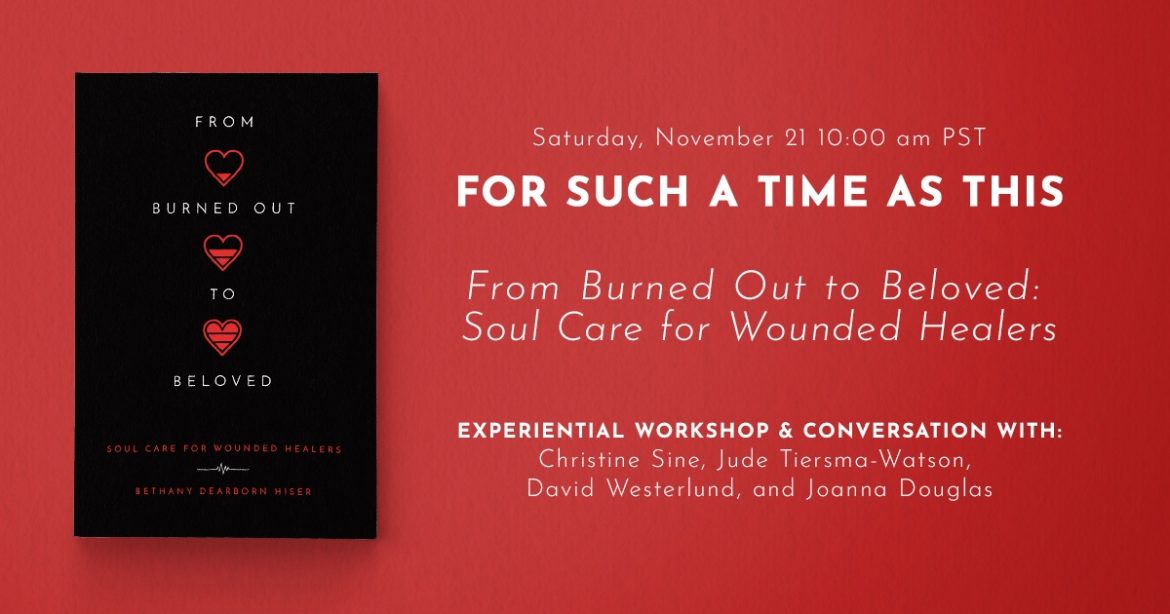guest post by Bethany Dearborn Hiser
Excerpt from From Burned Out to Beloved by Bethany Dearborn Hiser, Taken from Chapter Nine, “Moving From Shame to Self-Empathy”
Although I’ve been attempting to identify my emotions and practice self-empathy for a while, I’m just beginning to incorporate Welcoming Prayer into my life. It has been like tapping into a wellspring of water as I welcome the Living Water to work within me and receive my emotions. I invite you to learn from the work and wisdom of Contemplative Outreach and my spiritual director Lorie Martin, who has contributed to explaining the Welcoming Prayer practice throughout this exercise. (1) Together with these skilled practitioners, we invite the Holy Spirit to guide us.
Welcoming Prayer: An Emotional Awareness Practice
1. Notice and allow your feelings. Pause, breathe, and invite the Holy Spirit. With love and curiosity, begin to notice what you are feeling and allow yourself to feel it. Contemplative Outreach guides the practitioner:
Using your intuitive eye, move gently through the body, scanning for any discomfort, pain, uneasiness, itching, heat, cold, tension, tingling, or other sensations. . . . Rest (stop) there and sink into (experience) it. . . . All feelings, whether perceived as positive or negative, are welcomed. Feelings may intensify, dissolve, or change as we are present to them in the moment. Simply follow their movement.
Becoming aware of what’s stirring in us requires slowing down. When I’m moving fast—or in recovery language, sped up—it’s very hard to be aware of what I’m feeling and needing. I become disconnected from myself. I am also unaware of how the emotions of others are affecting me. My body might desperately try to communicate that I’m stressed, too busy, and near burnout.
Our body does communicate to us if we listen. Bessel van der Kolk says that if we avoid listening, we’re unable to detect what’s dangerous, harmful, and “just as bad, what is safe and nourishing.” We end up turning to other sources to help us regulate or calm down, such as “medication, drugs like alcohol, constant reassurance, or compulsive compliance with the wishes of others.” As codependent workaholics, we return to our need to be needed, to have impact, to please others, or to not fail. It’s too easy, as Brené Brown says, “to steamroll right over emotion.”
Welcoming Prayer encourages us to notice and to allow our emotion without figuring it out in the moment. Brown echoes the importance of just recognizing that we are feeling something. However, if you’re like me, you often want to know what you’re feeling and why. She offers some “Rumbling” questions that are part of the Rising Strong process:
- Why am I being so hard on everyone around me today?
- What’s setting me off?
- I can’t stop thinking about that conversation at work. Why?
- I’m having a strong emotional reaction. What’s going on?
We might consider exploring these questions after engaging in Welcoming Prayer.
2.“Welcome” Consent to God’s Presence. After allowing ourselves to feel, the second step of Welcoming Prayer is to consent to God’s presence with us in our feeling, emotion, thought, and experience. As Lorie Martin described to me, we let the feeling be an invitation to receive God’s love. We aren’t welcoming anxiety but rather welcoming God’s movement in us as we experience anxiety. This is a key distinction. According to Father Thomas Keating,
[Welcoming Prayer] embraces painful emotions experienced in the body rather than avoiding them or trying to suppress them. It does not embrace the suffering as such but the presence of the Holy Spirit in the particular pain, whether physical, emotional, or mental. . . . [In] giving the experience over to the Holy Spirit, the false-self system is gradually undermined and the true self liberated.
I want to acknowledge my anxiety, let myself feel it, and receive what it might be communicating. However, I don’t want to let anxiety take over me. I want to invite God into my anxiety.
3. Let Go: Release Needs to God. Now that we’ve let ourselves feel what we feel and welcomed God’s presence in us, we can release our desires and needs into God’s hands. Contemplative Outreach encourages letting go through saying: “I let go of the desire for safety and security, esteem and affection, and power and control. I embrace this moment as it is.”
When we let go of our desires, we aren’t saying that they’re unimportant or that we don’t have a need for security, affection, and control. We also aren’t saying that we have no reason to fear and that the circumstances we face are safe and healthy. For a person caught in an abusive relationship, fear is justified. We aren’t saying to just get over the fear or let go of the emotion.
Equipped to Extend Self-Empathy
When I notice I’m feeling a negative emotion, I want to jump quickly to letting go of that feeling because it doesn’t feel good. I want to be rid of it and then to connect with God and experience peace. Yet Welcoming Prayer invites us to notice the emotion and feel it in our bodies, to sit with it, and to welcome God with us. It invites us to not reject, deny, or react from the emotion but to say, “God, I need you. Come be with me in this. It feels awful. Hold me.”
In that place of pain—not after—we experience God’s loving embrace. Transformation happens there. We experience God in our darkness, in our trembling fear, in our paralyzing anxiety. God isn’t afraid or judgmental of negative emotions. Jesus himself said he was “crushed with grief ” in the garden of Gethsemane (Mark 14:34, The Passion Translation). Yet he also followed this with letting go of his need for security, affection, and control. In the presence of his Father, he relinquished it all and embraced the moment for what it was.
After we have come aware of God with us, in the muck and mire of our emotions and our lives, we take a deep breath and are able to trust and surrender our normal human needs. We are able to extend the empathy we often give others. Practicing self-empathy and compassion is common in resilience and self-care work. Marshall Rosenberg calls it “emergency first-aid”; we listen to what’s going on in us, being present and attentive to others. This may look like checking in with ourselves: “Oh, look at me, feeling that fear of rejection again. Yet it’s okay; it makes sense given the circumstances. It’s okay to feel what I feel.” The key is to notice gently, with compassion and not judgment.
By inviting God into our inner work, we can receive God’s grace and perspective. It isn’t just up to us to extend grace, empathy, and love toward ourselves. Without first consenting to God’s activity within me, I struggle to offer myself empathy. It feels awkward, or I get frustrated and feel ashamed that I’m so hard on myself, jumping right back into the shame spiral. Instead we can receive God’s love into our pain, hear how God sees and feels about us, and experience God’s presence with us. When we connect to the Living Water and extend ourselves grace, shame loosens its grip. We can let go more easily, wash off the mud, and feel the freedom that’s available to us.
As we cry out to God, God leans in, hears our cry, sets our feet firmly on solid truth, and gives us a new song of praise (Psalm 40). God breaks into our spiral of shame and lifts us up out of the miry pit. God is an active God, responding to our cries for help and freedom. In Psalm 18, God rescues the psalmist, who feels caught in the spiral of death, perhaps a spiral of shame and addiction. The psalmist, presumably David, calls out to God from a tormented place, “The cords of death encompassed me” (18:4). God powerfully responds, tearing through heaven and earth, lightning and thunder, fire and hailstone. After racing toward earth, he wrote,
He reached down from on high, he took me;
he drew me out of mighty waters.
He delivered me from my strong enemy, . . .
He brought me out into a broad place;
he delivered me, because he delighted in me.
(Psalm 18:16-17, 19)
God reaches down and takes hold of us in our suffering, when we are drowning in sorrow and pain. God delivers us from our enemies and frees us from the liar who leads us to believe false ideas about ourselves. God goes to great length to deliver and restore us—not because of pity but because God delights in us.
Welcoming Prayer is a practice that we can engage with at any moment: while leaving a meeting feeling angry and frustrated, while listening to a person share about their abusive partner, or while driving home, staring blankly into oblivion. In these moments, instead of tuning out, shoving, or running, may we tune in to what we’re experiencing with grace and compassion. May we allow our emotions to connect us with God, the tender, loving liberator. By grace we are saved—daily, if not moment by moment.
———————————————————————————————————————–
(1) According to Contemplative Outreach: Contemplative Outreach, “Welcoming Prayer Tri fold,” Contemplative Outreach, accessed January 8, 2019, contemplativeoutreach.org/sites/default/files/private/welcoming_prayer_trifold_2016.pdf. Used with permission.
Taken from From Burned Out to Beloved by Bethany Dearborn Hiser. Copyright (c) 2020 by Bethany Lynn Dearborn Hiser. Published by InterVarsity Press, Downers Grove, IL. www.ivpress.com
Bio for Bethany Dearborn Hiser

Bethany Dearborn Hiser is the director of soul care for Northwest Family Life, a network of therapists trained to work with survivors of domestic violence and sexual trauma. As a bilingual social worker, chaplain, and pastoral advocate, Hiser has worked in a variety of ministry and social service settings with people affected by addiction, sexual exploitation, incarceration, and immigration. She and her husband, Kenny, live in Seattle with their two young children.
For Such A Time As This:
From Burned Out To Beloved Launch
Saturday, November 21st 10-11am PST
Bethany Dearborn Hiser will share about why she wrote the book, lead some experiential exercises, and engage in a conversation with some of the book’s endorsers and soul care leaders about the relevance of the book to today’s times. She will be joined by:
- Christine Sine, founder & facilitator of Godspace Light,
author of The Gift of Wonder
- Jude Tiersma-Watson, associate professor of Urban Mission at Fuller Seminary & Inner Change
- Joanna Douglas, founder and member care provider at Mindful Member Care & Servants to Asia’s Urban Poor
- David Westerlund, Unlocking hidden resources by facilitating meaningful engagement. Be Present Discover Joy, LLC
This event is free and open to all. Although reading the book is not necessary to participate, you can find pre-order links here: www.bethanydearbornhiser.com/book

